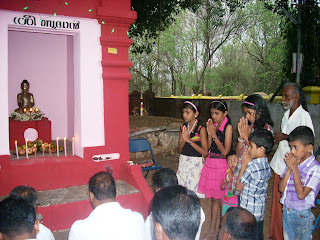The Blessed Buddha once said:
Bhikkhus and Friends: Once the mental release by infinite Friendliness
has been developed, frequently practised, firmly established, expanded,
made a vehicle, foundation, and brought to full perfection, then it will
be impossible for ill-will to take possession of and obsess the mind, for
the mental release by infinite Friendliness is the release from all ill-will!
Once the mental release by compassionate Pity & tender understanding
has been developed, frequently practised, firmly established, expanded,
made a vehicle, foundation, and brought to full perfection, then it will
be impossible for cruelty to take possession of and obsess the mind, for
the mental release by compassionate Pity is the release from all cruelty!
Once the mental release by mutual Joy rejoicing in other being's success
has been developed, frequently practised, firmly established, expanded,
made a vehicle, foundation, and brought to full perfection, then it will be
impossible for discontent to take possession of & obsess the mind, for
the mental release by mutual Joy is the release from all discontent!
Once the mental release by serene, still and imperturbable Equanimity
has been developed, frequently practised, firmly established, expanded,
made a vehicle, foundation, and brought to full perfection, then it will be
impossible for greed & lust to take possession of & obsess the mind, for
release by imperturbable Equanimity is the deliverance from all greed!
The 4 supreme mental attitudes (Brahmavihāra) are thus:Friendliness, Pity, Mutual Joy and Equanimity!
http://en.wikipedia.org/wiki/
More on this effective medicine of the 4 infinite and divine states:
http://What-Buddha-Said.net/
http://What-Buddha-Said.net/
http://What-Buddha-Said.net/
http://What-Buddha-Said.net/
http://What-Buddha-Said.net/
http://What-Buddha-Said.net/
http://What-Buddha-Said.net/
http://What-Buddha-Said.net/
http://What-Buddha-Said.net/
http://What-Buddha-Said.net/
http://What-Buddha-Said.net/
http://What-Buddha-Said.net/
http://What-Buddha-Said.net/
http://What-Buddha-Said.net/
http://What-Buddha-Said.net/
http://What-Buddha-Said.net/
http://What-Buddha-Said.net/
http://What-Buddha-Said.net/
http://What-Buddha-Said.net/
http://What-Buddha-Said.net/
http://What-Buddha-Said.net/
http://What-Buddha-Said.net/
Safe Medicine!
Have a nice & noble day!
Friendship is the Greatest! Bhikkhu Samāhita _/\_ ]
http://What-Buddha-Said.net











